The final day of the TMC ‘Transnational Moroccan Cinema Uncut’ symposium began with a panel entitled ‘Film Reception in/of Morocco’ and three complimentary presentations that took a varied approach to the topic, developing existing lines of enquiry in relation to discussion on the previous 3 days. Caroline Eades explored the question of how Moroccan cinema is viewed beyond the nation space and an idea of national cinema constructed in the transnational space of the film festival – taking as a case study two festivals in Washington DC, one a specialist Arab film festival, the other a more general film fest held annually in the city.
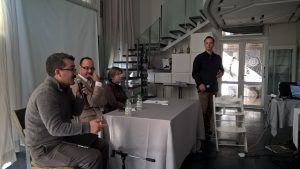
The second speaker of the morning, Yahya Laayouni, offered delegates an analysis of the current state of film criticism in Morocco. Yahya argued that whilst Moroccan cinema has made significant advances in the past two decades, critical writing in Arabic (crucial for those Moroccans) on Moroccan film remains rare and inconsistent. In order for Moroccan cinema to fully gain the attention it deserves, suggested Yahya, there was a need for more formal spaces (in print and online) for rigorous criticism to emerge in Arabic, as well as for more space to be given to female film critics. There was strong interest in the topic during the discussion that followed, not least due to the presence at the symposium of the esteemed Moroccan film critic and journalist Ahmed Boughaba.
Our final speaker on the panel, Rachid Naïm, returned to the subject of New Urban Cinema (NUC) in Morocco, a term introduced into the critical and scholarly lexicon in 2013 by our very own Jamal Bahmad to describe a popular movement of urban cinema focusing on social issues, produced by a new generation of dynamic Moroccan filmmakers. This recent trend in Moroccan cinema had already been addressed in the context of gender on day one of the symposium by Nadir Bouhmouch. Rachid Naïm chose to come at the topic from a different angle, with an analysis of the NUC in relation to questions of representation and aesthetics, exploring the theoretical possibilities and limitations of analyzing the NUC cinema in the context of postmodernism through close readings of Bensaïdi’s 2007 film WWW What a Wonderful World.
The first panel of this final day of the symposium maintained the energy, rigour and engagement shown by all of our speakers across the four days during the debate and discussion (formal and informal) that delegates, invited guests, industry professionals and members of the public have shared since Sunday in the Amani hotel – a location that has been conducive to free and open exchange of ideas amongst all those who have attended.
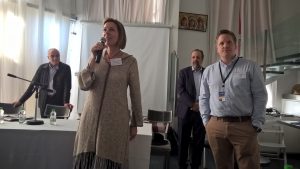
This sense of a genuine forum for debate about the current state of Moroccan cinema in all its (trans)national formations continued into the final session of the morning: an industry round table brought together by the Chambre Marocaine des Producteurs de Films (CMPF) in association with the TMC research team. We were honoured to welcome Ahmed el Maanouni (director, producer and president of the CMPF) to chair an industry panel, along with fellow members of the CMPF, producers Lamia Chraibi, Jamal Souissi, Khalid Zairi and Zakia Tahiri. The debate was placed in the context of the perceived ‘shock’, as Maanouni put it, of the absence, for the first time in the 16 year history of the festival of any Moroccan films at the Marrakech International Film Festival (with the exception of the Moroccan-Spanish-French-Qatari co-production Mimosas (2016) by Galician director Oliver Laxe), and the comedy Mon Oncle (Aammi, 2016) which was screened as part of the festival’s homage to stage and screen actor Abderrahim Tounsi.
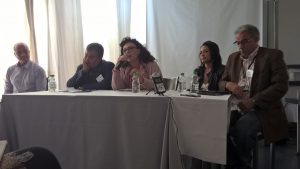
The lack of visibility for Moroccan cinema at this year’s festival, which has already generated huge and passionate debate in the Moroccan press as well as through social media, thus formed a starting point for a wider ranging debate around the challenges at what is increasingly appearing to be a crucial period for the continued development and diversity of Moroccan cinema. The panel members spoke with eloquence and passion about the need to support young talent (especially young producers), for more resources to be devoted to the crucial stage development of films, for a greater need for a genuine reciprocity between Moroccan film and TV, the role of the CCM, as well as a need for the industry to unite and lobby with a collective voice in the face of the forthcoming changes to the legal codes for cinema and audiovisual industries in Morocco.
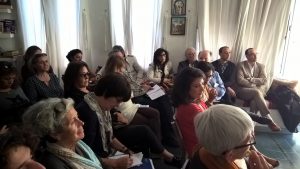
The passion of the panel was matched by that of interventions from the sizeable audience, who were given ample opportunity to offer their own perspective and proposals in a lively and open debate that ran for over two hours. The round table debate (covered by two Moroccan TV channels) fulfilled precisely the aim of the TMC symposium and the project more generally to provide a genuine forum for debate and exchange between researchers and film professionals. In this context, we were honoured to welcome an array of some of the most respected filmmakers in Moroccan cinema as audience members to the round-table, including Farida Benlyazid, M.A Tazi, Faouzi Bensaïdi and Daoud Aoulad-Syad. Director of the CCM, Sarim Fassi Fihri, was also in attendance and said a few words at the start of the session. The round table marked the first of what we hope will be many collaborations between the TMC research project and the CMPF.
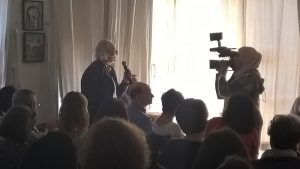
[NB. More detailed blogs will follow in the coming weeks on many of the issues raised in the round table discussion as well as Oliver Laxe’s film Mimosas, one of the hits of the festival]
To bring an end to an exceptional morning and a memorable conference, we were equally honoured to welcome Moroccan film critic and journalist Ahmed Boughaba to present the closing address. M. Boughaba’s experience as both a critic and a key figure in the ciné-club culture in Morocco of the 1960s, allowed the audience a unique insight as to the role of the Moroccan film critic and offered a response to Yahyah Laayouin’s paper from the opening panel of the morning, as well as reflections on the debate on the current state of Moroccan cinema that had taken place in the round-table.
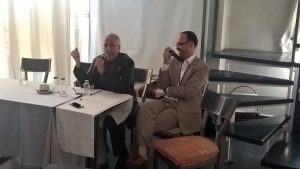
After an exhausting but exhilarating four days, the end of the symposium was marked by a reception and lunch in the tranquil surroundings of the Jardin Majorelle, attended by the academics, critics, filmmakers, industry professionals cinephiles – colleagues and friends, old and new.
The symposium has been a great success and will contribute immensely to the continued research of the TMC research project. The team wishes to thank the AHRC and University of Exeter for its support for the project – without which this symposium could not have taken place. The indomitable Stefanie Van de Peer also deserves a special mention for her tireless efforts, organizational skills and good humour that have successfully guided this symposium through all its various stages.
Thanks also to the Amani hotel for their warm welcome to all delegates and helpful assistance throughout the symposium.
Will Higbee